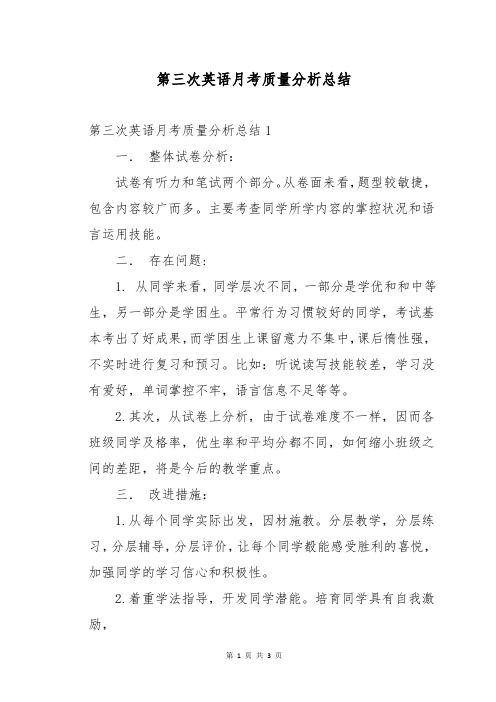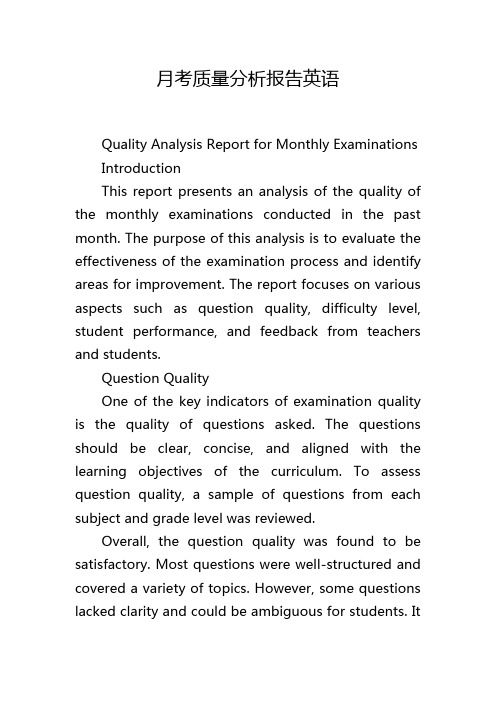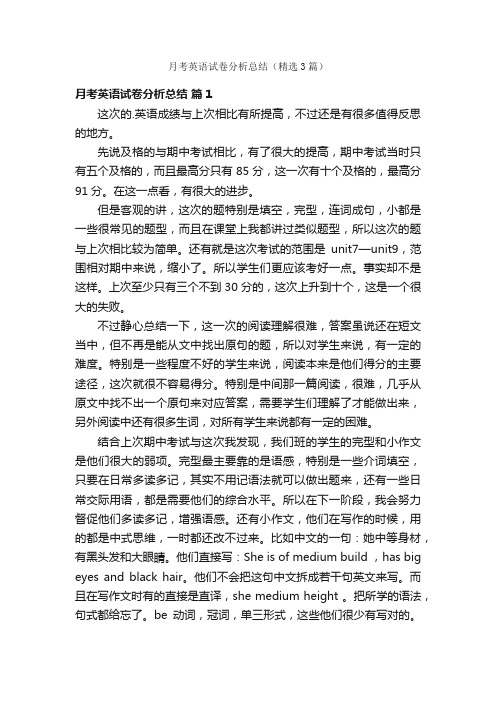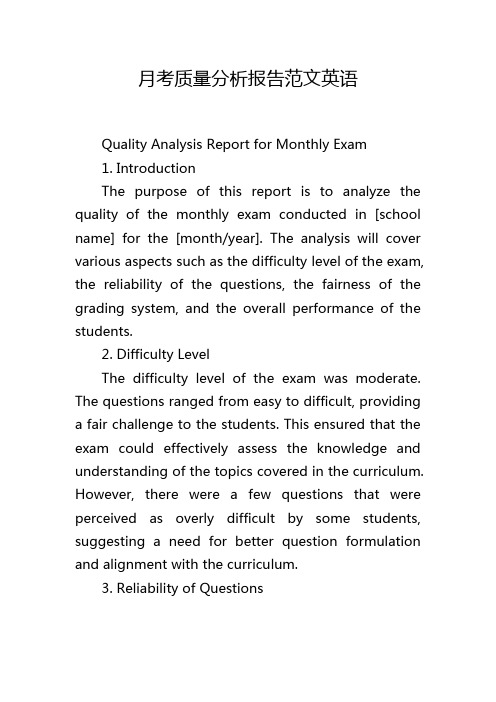袁志军英语月考质量分析报告
英语月考质量评估总结

英语月考质量评估总结概述本文档旨在对最近一次英语月考的质量进行评估总结,以便改进未来的教学和评估工作。
本次月考的主要目的是测试学生在英语听、说、读、写方面的能力,以及对课堂所学内容的掌握程度。
总体评估根据对本次月考的分析和评估,总体上学生们的英语水平呈现出较好的发展和提高。
大部分学生在听力和口语方面表现不错,能够理解简单的英语对话,能够进行日常生活情景的交流。
阅读方面学生们的理解能力和阅读速度有所提高,但仍可进一步加强。
写作方面,学生们的表达能力有待提高,尤其是在语法和拼写方面存在一些问题。
强项本次月考的结果显示了学生们在几个方面的强项:1. 听力:学生们在听力测试中表现出良好的理解能力,能够听懂简单的英语对话和短文,并正确回答相关问题。
2. 口语:学生们在口语测试中展示了积极参与的态度,敢于用英语进行简单的对话和交流。
3. 阅读:学生们的阅读理解能力有所提高,能够对简单的英语文章进行理解和回答问题。
有待改进之处尽管学生们在某些方面表现出较好的能力,但仍存在一些有待改进之处:1. 写作:学生们的写作能力还需要进一步提升,特别是在语法和拼写方面。
建议在课堂上加强写作训练,提供更多的写作指导和练。
2. 词汇和语法:学生们的词汇量和语法知识有待加强。
建议通过课堂教学和词汇练来提升学生的词汇水平和语法掌握程度。
3. 阅读速度:虽然学生们的阅读理解能力有所提高,但仍有部分学生阅读速度较慢。
建议在课堂上进行定期的阅读训练,以提高学生的阅读速度和准确性。
改进建议为了提高英语教学和评估的质量,以下是一些建议:1. 提供定期的写作训练和反馈,帮助学生们提升写作能力。
2. 加强词汇和语法的教学,提供更多的练和巩固机会。
3. 注重阅读训练,提高学生的阅读速度和理解能力。
4. 鼓励学生多参与口语练,提高口语表达能力。
5. 提供个性化教学,针对学生的个别问题和需求进行有针对性的辅导和指导。
结论本次英语月考评估结果显示学生们在英语能力的各个方面都有进步和提高。
第三次英语月考质量分析总结

第三次英语月考质量分析总结第三次英语月考质量分析总结1一.整体试卷分析:试卷有听力和笔试两个部分。
从卷面来看,题型较敏捷,包含内容较广而多。
主要考查同学所学内容的掌控状况和语言运用技能。
二.存在问题:1. 从同学来看,同学层次不同,一部分是学优和和中等生,另一部分是学困生。
平常行为习惯较好的同学,考试基本考出了好成果,而学困生上课留意力不集中,课后惰性强,不实时进行复习和预习。
比如:听说读写技能较差,学习没有爱好,单词掌控不牢,语言信息不足等等。
2.其次,从试卷上分析,由于试卷难度不一样,因而各班级同学及格率,优生率和平均分都不同,如何缩小班级之间的差距,将是今后的教学重点。
三.改进措施:1.从每个同学实际出发,因材施教。
分层教学,分层练习,分层辅导,分层评价,让每个同学殾能感受胜利的喜悦,加强同学的学习信心和积极性。
2.着重学法指导,开发同学潜能。
培育同学具有自我激励,3.加强课后辅导工作,特别是对学困生的教育教学,加强学习困难生的`及格率。
4.通过这次考试,我们总结了教学中得失。
我们找问题,定措施。
从而保证我们在以后教学工作中,适时拿出行之有效的教育教学方法和手段,力争使每个同学都有所进步,不断提高我校英语组教学质量。
第三次英语月考质量分析总结21、英语总分100分,班级平均分是94.59.高低分差是3.74,应当是在各位英语老师预料之内的,没有出事故。
从卷面上分析,英语排序题失分较多。
虽然平常也练习了排序,但是基本都是在投影上练习,缺乏约束力,同学的重视度不高,这也对我们英语老师提出了要求,练习难题是有效,不要为了练习而练习,效果却不好,个人认为,这类题目,最好印成数学每日一练类型,同学可以笔书写,也可以看见每个同学掌控状况。
2、同学单项选择基础题型上掌控不够好,个别题目错误率也很高,我们需要在平常对同学进行基础题型的训练,不要由于觉得简约,就一带而过。
题型的掌控度和题型敏捷改变,都需要在平常加以巩固。
月考质量分析报告英语

月考质量分析报告英语Quality Analysis Report for Monthly Examinations IntroductionThis report presents an analysis of the quality of the monthly examinations conducted in the past month. The purpose of this analysis is to evaluate the effectiveness of the examination process and identify areas for improvement. The report focuses on various aspects such as question quality, difficulty level, student performance, and feedback from teachers and students.Question QualityOne of the key indicators of examination quality is the quality of questions asked. The questions should be clear, concise, and aligned with the learning objectives of the curriculum. To assess question quality, a sample of questions from each subject and grade level was reviewed.Overall, the question quality was found to be satisfactory. Most questions were well-structured and covered a variety of topics. However, some questions lacked clarity and could be ambiguous for students. Itis recommended that a thorough review of questions be conducted prior to each examination to ensure their quality and prevent any confusion or misunderstanding among students.Difficulty LevelThe difficulty level of the questions is another important factor to consider. The questions should be challenging enough to test the students' understanding and knowledge, but should not be too difficult to demoralize or discourage them. To evaluate the difficulty level, the performance of students in each grade was analyzed.Based on the analysis, it was found that the difficulty level of the questions was appropriate for most grade levels. However, in the case of some subjects, such as mathematics, a few questions were deemed to be too difficult for the grade level. It is recommended that the difficulty level of questions be reviewed and adjusted to match the students' abilities and the learning objectives of each grade.Student PerformanceStudent performance is a crucial aspect of examination analysis. It provides insights into the students' understanding of the subjects and identifiesareas where they require additional support or guidance. The performance of students in each subject and grade level was reviewed and compared to previous examinations.Overall, the student performance was satisfactory. Most students showed a good understanding of the subjects and achieved scores that were consistent with their previous performances. However, there were also instances where a significant number of students performed below expectations in certain subjects. It is important to identify the reasons behind these lower performances and provide additional support or intervention to help these students improve.Teacher and Student FeedbackFeedback from both teachers and students is essential in assessing the quality of the examinations. It provides valuable insights into the strengths and weaknesses of the examination process and aids in identifying areas that need improvement. Feedback was collected through surveys and discussions with teachers and students.According to the feedback received, teachers generally agreed that the examination process waswell-organized and fair. They appreciated the variety of questions asked and the alignment with the curriculum. However, some teachers expressed concerns about the time allocated for the examination and suggested extending it to allow students more time to complete the tasks.Students, on the other hand, felt that the difficulty level of the examinations was balanced but felt rushed due to time constraints. Some students also provided suggestions for including more practical or real-life application questions in subjects such as science and mathematics.ConclusionIn conclusion, the analysis of the monthly examinations indicated that overall, the quality of the examinations was satisfactory. The questions were mostly well-structured and aligned with the curriculum. The difficulty level was appropriate for most grade levels, but some adjustments are required in certain subjects. Although student performance was generally satisfactory, there were instances where additional support may be needed.It is recommended that a thorough review of questions be conducted prior to each examination toensure clarity and avoid ambiguity. The difficulty level of questions should be adjusted to match the students' abilities and learning objectives. Additional support and intervention should be provided to students who performed below expectations. Lastly, feedback from teachers and students should be used to make improvements in the examination process, such as allocating more time for completion and including practical application questions.。
月考英语试卷分析总结(精选3篇)

月考英语试卷分析总结(精选3篇)月考英语试卷分析总结篇1这次的.英语成绩与上次相比有所提高,不过还是有很多值得反思的地方。
先说及格的与期中考试相比,有了很大的提高,期中考试当时只有五个及格的,而且最高分只有85分,这一次有十个及格的,最高分91分。
在这一点看,有很大的进步。
但是客观的讲,这次的题特别是填空,完型,连词成句,小都是一些很常见的题型,而且在课堂上我都讲过类似题型,所以这次的题与上次相比较为简单。
还有就是这次考试的范围是unit7—unit9,范围相对期中来说,缩小了。
所以学生们更应该考好一点。
事实却不是这样。
上次至少只有三个不到30分的,这次上升到十个,这是一个很大的失败。
不过静心总结一下,这一次的阅读理解很难,答案虽说还在短文当中,但不再是能从文中找出原句的题,所以对学生来说,有一定的难度。
特别是一些程度不好的学生来说,阅读本来是他们得分的主要途径,这次就很不容易得分。
特别是中间那一篇阅读,很难,几乎从原文中找不出一个原句来对应答案,需要学生们理解了才能做出来,另外阅读中还有很多生词,对所有学生来说都有一定的困难。
结合上次期中考试与这次我发现,我们班的学生的完型和小作文是他们很大的弱项。
完型最主要靠的是语感,特别是一些介词填空,只要在日常多读多记,其实不用记语法就可以做出题来,还有一些日常交际用语,都是需要他们的综合水平。
所以在下一阶段,我会努力督促他们多读多记,增强语感。
还有小作文,他们在写作的时候,用的都是中式思维,一时都还改不过来。
比如中文的一句:她中等身材,有黑头发和大眼睛。
他们直接写:She is of medium build ,has big eyes and black hair。
他们不会把这句中文拆成若干句英文来写。
而且在写作文时有的直接是直译,she medium height 。
把所学的语法,句式都给忘了。
be动词,冠词,单三形式,这些他们很少有写对的。
总归来说,还是训练不够,没有对他们强调,没有让他们注意。
月考质量分析报告范文英语

月考质量分析报告范文英语Quality Analysis Report for Monthly Exam1. IntroductionThe purpose of this report is to analyze the quality of the monthly exam conducted in [school name] for the [month/year]. The analysis will cover various aspects such as the difficulty level of the exam, the reliability of the questions, the fairness of the grading system, and the overall performance of the students.2. Difficulty LevelThe difficulty level of the exam was moderate. The questions ranged from easy to difficult, providing a fair challenge to the students. This ensured that the exam could effectively assess the knowledge and understanding of the topics covered in the curriculum. However, there were a few questions that were perceived as overly difficult by some students, suggesting a need for better question formulation and alignment with the curriculum.3. Reliability of QuestionsThe questions in the exam were generally reliable. Each question had a clear and concise statement, and the answers provided were accurate and in line with the expected knowledge level of the students. However, there were a few questions that were ambiguous and could be interpreted in multiple ways. In future exams, more attention should be given to ensure clarity and eliminate any potential confusion.4. Grading SystemThe grading system used in the exam was fair and transparent. It followed a standardized rubric that clearly defined the criteria for marking each question. However, there were a few instances where the marking scheme was not consistently applied, leading to slight discrepancies in the final scores. To ensure fairness, it is recommended to provide training to the teachers on the proper application of the rubric and regular monitoring of the grading process.5. Performance of StudentsThe overall performance of the students in the monthly exam was satisfactory. The majority of the students were able to demonstrate a good understanding of the topics and perform well. However, there were a few students who struggledand scored below average. This indicates the need for additional support and intervention for those students, such as remedial classes or one-on-one tutoring, to help them improve their performance.6. RecommendationsBased on the analysis, the following recommendations are proposed for future monthly exams:- Review and revise the question bank to ensure that questions align closely with the curriculum.- Provide clearer instructions and ensure that questions are unambiguous.- Conduct regular training sessions for teachers on the marking scheme and consistency in grading.- Implement additional support measures for struggling students to improve their performance.7. ConclusionOverall, the monthly exam conducted in [school name] for the [month/year] was of satisfactory quality. While there were some areas that needed improvement, such as question clarity and grading consistency, the results provide valuable feedback for future exam preparations. By implementing the recommended measures, it is expected that thequality of the exams and the performance of the students will further improve.。
月考英语成绩质量分析报告

月考英语成绩质量分析报告月考英语成绩质量分析报告1. 引言英语作为一门国际交流语言,在现代社会中具有重要的地位。
学生的英语水平不仅关系到他们的学术成绩,还与他们的全球竞争力和跨文化沟通能力息息相关。
本报告分析了本校学生在最近一次月考中的英语成绩,以评估他们的英语水平和学习质量。
2. 数据概述本次月考共有500名学生参加,平均成绩为72.5分,标准差为8.3分。
根据成绩分布情况,将学生划分为五个等级:优秀(90-100分)、良好(80-89分)、中等(70-79分)、及格(60-69分)和不及格(60分以下)。
下面是每个等级的学生人数和占比:- 优秀:50人,占比10%- 良好:120人,占比24%- 中等:200人,占比40%- 及格:100人,占比20%- 不及格:30人,占比6%3. 学生表现分析从成绩分布情况可以看出,相对来说,学生的整体表现尚可。
然而,仍有一部分学生成绩较差,需要加强学习。
同时,有一部分学生取得了优异的成绩,值得表扬和鼓励。
针对优秀学生群体,应该及时给予表扬,并提供更高难度的学习任务,以满足他们的学习潜力。
对于成绩较差的学生,我们应该找出他们的学习难点,并提供个性化的辅导和指导,帮助他们提高成绩。
4. 难题分析分析学生的错题情况可以帮助我们找出他们普遍存在的问题和困难,为改进教学方法提供指导。
根据教师的评估,本次月考中学生普遍存在的问题有:- 词汇掌握不牢固:一些学生在词汇应用上偏弱,容易出现理解上的错误。
- 语法错误较多:学生在语法应用上出现错误的情况较多,需要加强语法知识的掌握和应用能力。
- 阅读理解能力有待提高:学生对于长篇阅读的理解能力相对较弱,缺乏整体把握能力。
基于以上问题,教师将会在后续的教学中重点针对词汇积累、语法训练和阅读训练进行强化,以提高学生的整体英语素养。
5. 教学建议为了提高学生的英语水平和学习质量,我们建议:- 针对学生的个别差异,提供个性化的学习指导和辅导;- 加强语法和词汇的教学,提供多样化的练习对学生的语言应用能力进行训练;- 增加阅读材料的难度,培养学生的阅读理解和整体把握能力;- 建立多种评估方式,从而全面了解学生的学习情况;- 提供积极的学习环境和学习氛围,鼓励学生自主学习和积极参与课堂活动。
英语月考质量分析报告范文
英语月考质量分析报告范文Quality Analysis ReportIntroduction:The purpose of this quality analysis report is to provide an assessment of the English monthly examination conducted in our school. The report aims to identify the strengths and weaknesses of the examination, analyze the performance of the students, and suggest possible improvements for future examinations.Methods:To accomplish the objectives outlined above, a sample of 100 students was randomly selected from different grades and classes. The examination papers were thoroughly reviewed to evaluate the question quality, difficulty level, and adherence to the curriculum. Additionally, student performance was analyzed by examining the distribution of scores, identifying common mistakes, and conducting interviews to gather feedback.Findings:1. Question Quality:The overall quality of the questions in the examination was satisfactory. Multiple question types, including multiple-choice, fill in the blanks, and short answer questions, were used effectively. The questions were well-structured and covered a range of topics from the English curriculum. However, there were a few instances where the questions were ambiguous and could have been clearer.2. Difficulty Level:The difficulty level of the examination was appropriate for the targeted grade levels. The questions were challenging enough to test the students' knowledge and skills, without being overwhelming. However, some students found certain sections of the examination relatively more difficult, indicating a need for better preparation and guidance in those areas.3. Adherence to Curriculum:The examination adequately covered the English curriculum for the respective grade levels. The topics and concepts addressed in the questions aligned with the learning objectives outlined in the curriculum. However, there were a few isolated instances where the questions touched upon topics not covered inclass, requiring students to rely on their general knowledge rather than what was taught.4. Performance Analysis:The distribution of scores indicated a satisfactory overall performance by the students. The majority of students scored above average, indicating a good grasp of the subject matter. However, there were a few students who performed below average, suggesting a need for remedial support. Common mistakes observed were related to grammar, vocabulary, and comprehension skills. This highlights the areas where students require more focus and practice.Recommendations:Based on the findings of this quality analysis report, the following recommendations are suggested for the improvement of future English monthly examinations:1. Enhance question clarity and avoid ambiguity by reviewing and revising the questions before the examination.2. Provide additional support to students in areas where they faced difficulty, such as grammar, vocabulary, and comprehension skills.3. Conduct regular mock examinations to familiarize students with the examination format and increase their confidence.4. Encourage active participation in English language activities, such as debates, presentations, and discussions, to enhance students' speaking and listening skills.5. Provide students with feedback on their performance and offer remedial support where necessary.Conclusion:In conclusion, the English monthly examination conducted in our school demonstrated satisfactory quality and provided an accurate measure of students' knowledge and skills. However, certain areas for improvement have been identified, such as question clarity, targeted support in challenging areas, and additional opportunities for practice. By implementing the recommendations outlined in this report, the school can work towards enhancing the quality of future English examinations and ensuring a comprehensive learning experience for the students.。
初中英语第一次月考质量分析
初中英语第一次月考质量分析一、考试概况本次初中英语第一次月考是为了全面了解学生的英语研究情况而进行的。
考试共分四个部分:听力、阅读、语法和写作。
共设有五十道题目,共计100分。
考试时间为90分钟。
二、听力分析听力部分共计20分,包括听力理解和听力填空。
听力理解部分主要测试学生对于英语听力材料的理解能力,题型包括选择题和配对题。
听力填空部分测试学生根据所听内容填写相关信息的能力。
从整体来看,学生在听力方面的表现还有待提高。
三、阅读分析阅读部分共计30分,包括阅读理解和完型填空。
阅读理解部分主要测试学生对于篇章内容的理解能力,题型多样,包括选择题和判断题等。
完型填空部分测试学生根据上下文语境填写正确的单词。
学生在阅读方面的表现较为一般。
四、语法分析语法部分共计30分,主要测试学生对于语法知识的掌握程度,题型包括选择题和填空题。
从整体来看,学生在语法方面的表现还有进步的空间。
五、写作分析写作部分共计20分,主要测试学生的写作能力。
题目要求学生根据给定的内容和要点,写一篇80词的短文。
学生在写作方面的表现还有待提高。
六、总结与建议从以上的分析可见,学生在初中英语第一次月考中的表现各有优劣。
为了提升学生的英语研究质量,建议在听力训练上加大力度,提高学生的听力理解能力;在阅读训练上加强篇章理解,培养学生的阅读思维能力;在语法训练上注重基础知识的巩固和拓展;在写作训练上加强写作能力的培养。
同时,建议学生们平时多进行英语研究,提高研究的主动性和积极性。
以上为初中英语第一次月考的质量分析。
高三英语月考质量分析报告
高三英语月考质量分析报告**高三英语月考质量分析报告****引言**英语作为一门重要的学科,对于高中学生的学习和发展具有重要意义。
月考是检验学生成绩和掌握程度的一种较为直观的方式,也是学校教学质量的一项重要评价指标。
本报告将对高三英语月考的质量进行分析,以发现问题,并提出相应的改进措施,以提高教育质量。
**一、考试概况**本次月考共设有听力、单项选择、完形填空、阅读理解和写作等五个部分,试题难度适中,考查内容比较全面,语言要求和学生的实际水平相匹配。
试题总体设计合理,能够全面考察学生的英语语言技能和综合应用能力。
**二、试题分析**1. 听力部分:听力材料内容紧密联系生活实际,题目设计灵活多样,涵盖了各种听力技能。
但是,听力材料难度适中,没有考查到学生对于长对话和学术讲座的理解能力,对于提高学生的听力水平和学科知识的掌握能力有一定的欠缺。
2. 单项选择部分:单项选择题内容紧密联系课本知识,题型多样,能够考察学生对于语法、词汇和句子结构等方面的掌握水平。
但是,部分题目存在选项相近、容易混淆的情况,对学生的辨析能力有一定的挑战。
3. 完形填空部分:完形填空的文章内容贴近生活,题目设计灵活多样,对学生的阅读理解和语言运用能力进行综合考察。
但是,部分题目难度较大,涉及到较为复杂的语言结构和推理能力,对于学生的思维能力要求较高。
4. 阅读理解部分:阅读理解的文章短小精悍,涉及到了各个领域的内容,题目设计多样,能够考察学生的阅读理解和推理能力。
但是,部分题目过于依赖于文章,没有给学生提供足够的信息和提示,对学生的阅读能力以及运用逻辑推理的能力有一定的考验。
5. 写作部分:写作部分要求学生根据提供的材料进行写作,考察学生的综合运用能力。
但是,部分学生对于所提供的杨洪涛作文的内容理解不够准确,导致写作的语言表达和观点分析存在一定的偏差。
**三、问题分析**1. 考试内容设计过于依赖教材,缺乏拓展性和综合性,导致学生对于广泛知识和实际应用的掌握能力不够。
英语月考试卷分析总结(通用5篇)
英语月考试卷分析总结(通用5篇)英语月考试卷分析总结(通用5篇)总结是在一段时间内对学习和工作生活等表现加以总结和概括的一种书面材料,它在我们的学习、工作中起到呈上启下的作用,因此非常有必需要写一份总结哦。
总结一般是怎么写的呢?下面是我收集整理的英语月考试卷分析总结(通用5篇),供大家参考借鉴,期望可以帮忙到有需要的朋友。
英语月考试卷分析总结1本学期这次月考,充分检测出同学在这一阶段主要存在的问题:1.部分基础较差的同学基础学问未把握好,丢分比较严峻,由此可见平常对基础较差的同学要加强基础学问的训练。
例如依据句意及首字母提示,完成下类单词拼写这一题。
2.单项小择题主要考察一些重要语法学问的运用。
3.完型填空和阅读理解这两大块也就是提高力量的题目,基础好的同学失分都比较少,有些做的不好的同学,这就反映出同学理解分析概括力量特别缺乏。
4. 书面表达,此题大多数同学是会读、懂意思,但不知道怎么写出来.因此,在教学过程中我们要多留意查找解决方法。
第1页/共10页1.连续抓好基础学问的训练,打牢基本功,使同学把握肯定的英语基础学问和听、说、读、写技能,形成肯定的综合语言运用力量是基础教育阶段英语课程最重的任务之一,从起始年级开头就重视基础学问的积累,努力培育同学良好的学习习惯,为以后的学习打下扎实的基础。
2. 加强同学阅读的力量,课外选用一些内容健康,时代感强,学问性,趣味性并存的短文来让同学阅读,通过大量阅读来培育同学的语感。
3.抓好课外补差,削减两级分化现象。
不放弃每个差生。
4.充分利用好每一个45分钟,仔细备课,设计教学过程,组织敏捷多样的课堂教学活动,促使每位同学乐观参加,从而才能激发同学的学习和参加的爱好,提高同学学习英语的乐观性。
总之,在今后的教学过程中,要努力发觉同学中的问题,并努力改进教学方法,力争让每名同学都能有所进步。
英语月考试卷分析总结2本次八年级英语月考从试卷上看考察学问面较广,题型较丰富,敏捷运用程度接近中考。
- 1、下载文档前请自行甄别文档内容的完整性,平台不提供额外的编辑、内容补充、找答案等附加服务。
- 2、"仅部分预览"的文档,不可在线预览部分如存在完整性等问题,可反馈申请退款(可完整预览的文档不适用该条件!)。
- 3、如文档侵犯您的权益,请联系客服反馈,我们会尽快为您处理(人工客服工作时间:9:00-18:30)。
高一英语月考质量分析报告的报告
袁志军
(2016年10月10日)
高中一年级于9月下旬进行了本学期第一次月考,经过认真的组织考试、评阅试卷、数据分析,在任课教师试卷分析的基础上,特撰写我年级英语学科第一次月考质量分析报告,并将质量分析报告汇总如下:
一、试卷分析
总的来讲,这次月考英语试卷紧扣教材和课程标准,体现了必修一第一单元至第二单元前两课的重点和难点,能够覆盖到所讲内容,难易适中,结构合理,具有较高的信度和效度。
但也存在某些问题,如试卷部分的阅读理解部分,有些试题建构不合理,四个选项的答案存在歧义,语法填空部分的有些词汇超出了学生所学内容;答题的形式、结构,考察知识点的分布、难度的撑控还不够全面。
短文改错部分甚至出现了十一个错误,给老师改卷带来判分标准困难;上述情况是下一步出题时需要注意改进的地方。
二、答题分析
英语试卷批改完,我们进行了答题分析和数据分析。
列举出了一卷和二卷的最高分、最低分、平均分、及格率、优秀率、分数段人数等。
我甚至将每个题型或题目的得分情况进行了认真的统计和分析,并找出失分原因和应对措施,我相信这对下一步教学应该会有很强的指导意义。
综合学生答卷情况,失分的主要原因有:
1、一些课本上要求的基础知识竟然还掌握不牢。
知识与能力相辅相成,没有一定知识的积累是无论如何也谈不上能力提升的,平时积累不够,一卷的阅读理解阅读能力差,二卷作文的语言组织能力差;课本上要求掌握的一些词汇和短语掌握还不够熟练,缺乏做题技巧;一些基础语法欠缺、词汇贫乏;知识结构模糊,不会融会贯通。
2、答题技巧不足。
英语试卷每个题型都有不同的答题技巧,如阅读理解做题技巧,语法填空做题技巧,短文改错常考点以及写作技巧等等,这些方面的缺乏,就会导致学生无从作答,答而无分。
3、答题规范不够。
英语二卷尤其是作文都存在书写问题,缺乏规范。
这些也是学生失分的主要因素。
三、教学建议
1、教学上,突出词汇和语法基础,降低教学重心。
学生基础差是不争的事实,但是只停留于抱怨和忧虑无济于事,只有切实行动起来,根据学生的知识基础和学习现状,调整教学策略和教学方法,通过精讲多练,夯实基础,循序渐进才能让学生逐步增强自信,取得进步。
以学定教,适合学生的才是最好的。
2、学习上,重视阅读课本,提高理解能力。
阅读课本不仅是英语学习所必须的,也是提高学生阅读能力的重要途径和方法。
现在有些学生很少搞阅读,觉得简单不值一读,重点放在词汇记忆上,这是误区。
读一读课本前面的序言就知道学习必修模块一的意义和方法:读一读课本前面的目录,就能了解这一模块的主要内容和知识架构,课前读一读叫预习,课后读一读叫巩固。
阅读是输入,是吸收,做题是输出,是运用;没有输入,拿什么输出?审题不清,理解不准,连课本内容都不知道,这都是缺少阅读课本造成的。
忽视课本的阅读和学习,只专注于零碎的不系统的题目训练,只能是舍本逐末、事倍功半。
因此老师要引导学生重视课本的系统学习,教给学生阅读的方法和技巧,帮助他们构建清晰的知识网络,找出重点,抓住核心,在此基础上,再辅以适当的练习,拓展和延伸。
其实,学习就是一个读书“由薄到厚”再“由厚到薄”的过程。
3、教学管理上,要加强集体备课。
仅坐在同一个办公室里备课不叫集体备课。
我们要求的集体备课是形式和内容的统一。
下一周该讲哪个单元或章节了,我们就在约定的集体备课时间里,由事先确定的主备人说一说教学目标、教学程序、教学方法、教学的重难点、训练的设计、作业的布置等,然后大家提出补充和修改的意见,形成统一的教学思路,大家再根据这一思想,写出教案,实施教学。
在实际教学时,老师可以充分发挥个性特长和教学艺术。
这样做能发挥集体智慧和团体力量,促使学科成绩的整体提升。
4、开展听、评课活动。
听、评课活动是相互学习、共同提高的有效手段。
教学有方、教无定法。
同样一节课、同样一个知识点,教法因人而异,哪种方法效果更好,有比较才有鉴别。
当我们抱怨学生,我讲了多少遍,为什么你们就学不会的时候,是否反问一下自己,我讲了多少遍,为什么就教不会学生呢?听一听别人的课,或许某个细节就让你有所感悟或灵感闪现,原来问题这么简单。
5、备课组要加强研讨,尤其要精心设计课堂练习,提高课堂练习的有效性。
在拟定限时连、周考或月考试卷时,一定要以相应时间内的教学内容为主,充分理清知识点,不必拘泥于高考试卷的综合模式,不求学科覆盖面,只管所学再现率。
加强针对性,突出重点和平时作业中的易错点,争取做到周周清、月月清。
总之,本次月考当中发现的问题我感觉只是暂时的,只要我们正视问题的存在,钻研业务,寻找问题解决的突破口,我们下一步的英语教学就一定会更上一层楼。
